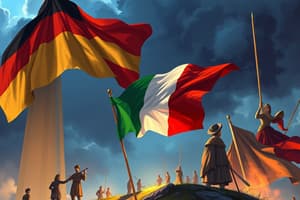Podcast
Questions and Answers
What key demand did the educated middle classes make during the 1848 revolution?
What key demand did the educated middle classes make during the 1848 revolution?
- The abolition of all political associations
- Creation of a nation-state on parliamentary principles (correct)
- Reinstatement of feudal systems
- Establishment of monarchies in all nations
Which event marked an armed rebellion against Russian rule in the early 19th century?
Which event marked an armed rebellion against Russian rule in the early 19th century?
- The 1831 uprising (correct)
- The Frankfurt Parliament
- The Revolution of the Liberals
- The rise of Romanticism
What role did culture play in the development of nationalistic sentiments in Europe?
What role did culture play in the development of nationalistic sentiments in Europe?
- It only promoted regional identities
- It helped express and shape nationalist feelings (correct)
- It had no significant impact
- It was solely focused on economic issues
How did food shortages in the 1840s influence political movements in Europe?
How did food shortages in the 1840s influence political movements in Europe?
What was the outcome of the Frankfurt Parliament's efforts in 1848?
What was the outcome of the Frankfurt Parliament's efforts in 1848?
What principle did liberal nationalism advocate regarding political rights?
What principle did liberal nationalism advocate regarding political rights?
Which of the following was a consequence of the Industrial Revolution on social classes?
Which of the following was a consequence of the Industrial Revolution on social classes?
Which change was introduced during the French Revolution regarding national identity?
Which change was introduced during the French Revolution regarding national identity?
What was one effect of the Napoleonic Code established by Napoleon in France?
What was one effect of the Napoleonic Code established by Napoleon in France?
How did nationalism impact the political landscape of Europe in the nineteenth century?
How did nationalism impact the political landscape of Europe in the nineteenth century?
Flashcards are hidden until you start studying
Study Notes
The Romantic Imagination and National Feeling
- Culture significantly influenced the rise of nationalism through art, poetry, stories, and music.
- Romanticism sought to foster nationalist sentiment and emphasized the importance of language.
- The imposition of the Russian language led to a rebellion in 1831 against Russian dominance.
Hunger, Hardship and Popular Revolt
- The 1830s in Europe were marked by economic struggles, increased population, and rising food prices.
- Poor harvests resulted in widespread poverty, especially in urban areas.
- In 1848, food shortages and unemployment triggered mass protests in Paris.
The Revolution of the Liberals
- The educated middle class spearheaded the 1848 revolution, demanding a nation-state founded on parliamentary principles.
- Political associations convened in Frankfurt to push for an all-German National Assembly.
- On 18 May 1848, 831 elected representatives participated in the Frankfurt Parliament; they sought to establish a constitutional monarchy.
- Friedrich Wilhelm IV of Prussia rejected the crown offered by the Parliament, opposing the elected assembly.
The French Revolution and the Idea of the Nation
- Nationalism emerged during the French Revolution of 1789, transferring sovereignty from monarchy to citizens.
- Concepts like "la patrie" (the fatherland) and "le citoyen" (the citizen) were introduced.
- The tricolour became the national flag, replacing the prior emblem.
The Impact of Napoleonic Rule
- Napoleon's Civil Code of 1804 abolished birth privileges, establishing legal equality and property rights.
The Making of Nationalism in Europe
- Germany, Italy, and Switzerland were fragmented into various kingdoms and duchies with independent rulers.
- The aristocracy held significant power while the majority population consisted of peasants.
The Aristocracy and the New Middle Class
- Political and social power was primarily in the hands of the aristocracy.
- The industrial revolution led to the emergence of a working class and a middle class composed of industrialists and professionals.
What Did Liberal Nationalism Stand For?
- Liberalism, derived from "liber" (meaning free), championed property-owning men’s right to vote; women and non-property holders were excluded.
The Strange Case of Britain
- Before the 18th century, Great Britain did not exist as a unified nation; its power grew through wealth and influence.
- The Act of Union (1707) united England and Scotland, forming the 'United Kingdom of Great Britain'.
- Ireland was incorporated forcibly in 1801. Symbols like the Union Jack and "God Save Our Noble King" were promoted as national symbols.
Visualising the Nation
- Artists in the 18th and 19th centuries often depicted nations as female figures representing ideals like Liberty and Justice.
- Liberty was symbolized by red caps or broken chains, while Justice was portrayed as a blindfolded woman with scales.
Nationalism and Imperialism
- By the late 19th century, nationalism intertwined with imperialism, leading to tensions, particularly in the Balkans.
- The Balkans, with modern nations including Romania, Bulgaria, and Serbia, became a conflict hotspot due to the declining Ottoman Empire and nationalist aspirations.
- Rivalries among European powers over colonies and military strength culminated in wars and ultimately contributed to the outbreak of World War I in 1914.
Studying That Suits You
Use AI to generate personalized quizzes and flashcards to suit your learning preferences.




